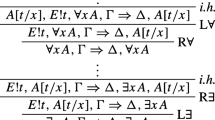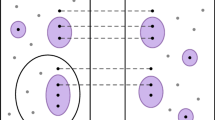Abstract
This paper presents a bivalent extensional semantics for positive free logic without resorting to the philosophically questionable device of using models endowed with a separate domain of “non-existing” objects. The models here introduced have only one (possibly empty) domain, and a partial reference function for the singular terms (that might be undefined at some arguments). Such an approach provides a solution to an open problem put forward by Lambert, and can be viewed as supplying a version of parametrized truth non unlike the notion of “truth at world” found in modal logic. A model theory is developed, establishing compactness, interpolation (implying a strong form of Beth definability), and completeness (with respect to a particular axiomatization).
Similar content being viewed by others
REFERENCES
Bencivenga, E.: Free Logics, in D. Gabbay and F. Guenthner (eds), Handbook of Philosophical Logic, Vol. III, Kluwer Academic Publishers, Dordrecht, 1986, pp. 373–426.
Bencivenga, E., Lambert, J. K. and van Fraassen, B. C.: Logic, Bivalence, and Denotation, Ridgeview, Atascadero, Calif., 1991.
Chang, C. and Keisler, H.: Model Theory, 3rd edn, Elsevier North-Holland, Amsterdam and New York, 1990.
Cocchiarella, N.: A logic of possible and actual objects, J. Symbolic Logic 31 (1996), 388.
Feferman, S.: Logic for termination and correctness of functional programs, in Y. N. Moschovakis (ed.), Logic from Computer Science, Springer-Verlag, Berlin and New York, 1992, pp. 95–127.
van Fraassen, B. C.: Singular terms, truth-value gaps, and free logic, J. Philosophy 67 (1966), 481–495.
van Fraassen, B. C. and Lambert, J. K.: Derivation and Counterexample, Dickeson, 1972.
Gumb, R. D. and Lambert, J. K.: Definitions in nonstrict positive free logic, Modern Logic 7 (1979), 25–55 (errata and corrected version available from ftp://ftp.uml.edu/gumb).
Hoare, C. A. R.: An axiomatic basis of computer programming, Comm. ACM 12 (1969), 576–583.
Leblanc, H.: Truth-Value Semantics, North-Holland, Amsterdam 1976.
Leblanc, H. and Thomason, R. H.: Completeness theorems for some presuppositionfree logic, Fund. Math. 62 (1968), 125–164.
Lambert, J. K.: The definition of E! in free logic, in Abstracts: The International Congress for Logic, Methodology and Philosophy of Science, Stanford University Press, Palo Alto, 1960.
Lambert, J. K.: Existential import revisited, Notre Dame J. Formal Logic 4 (1963), 133–144.
Lambert, J. K.: Free logic and the concept of existence, Notre Dame J. Formal Logic 8 (1967), 133–144.
Lambert, J. K.: Free Logics. Their Foundations, Character, and Some Applications Thereof, Academia Verlag, Sankt Augustin, 1997.
Lambert, J. K.: Free logics, in L. Goble (ed.), The Blackwell Guide to Philosophical Logic, Blackwell, Oxford and Malde, MA, 2000 (to appear).
Lehman, S.: Strict fregean logic, J. Philos. Logic 23(3) (1994), 307–336.
Leonard, H. S.: The logic of existence, Philos. Stud. 7 (1956), 49–64.
Meyer, R. K. and Lambert, J. K.: Universally free logic and standard quantification theory, J. Symbolic Logic 33 (1968), 8–26.
Scott, D. S.: Existence and description in formal logic, in A. Schoenman (ed.), Russell, Philosopher of the Century, Allen & Unwin, London, 1967, 181–200.
Smiley, T.: Sense without denotation, Analysis 20 (1960), 125–135.
Woodruff, P.:On supervaluations in free logic, J. Symbolic Logic 49 (1984), 943–950.
Author information
Authors and Affiliations
Rights and permissions
About this article
Cite this article
Antonelli, G.A. Proto-Semantics for Positive Free Logic. Journal of Philosophical Logic 29, 277–294 (2000). https://doi.org/10.1023/A:1004748615483
Issue Date:
DOI: https://doi.org/10.1023/A:1004748615483




